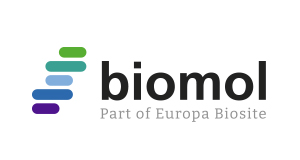Cardiotrophin-1, rat recombinant (rrCT-1)
Cardiotrophin-1, rat recombinant (rrCT-1)
Kategorie: Cytokines
Formulation: lyophilized
Storage: -20°C
Weight: 21400 D
Purity: >95%
Description: Cardiotrophin-1 rat recombinant produced in E. coli is a single, non-glycosylated, polypeptide chain containing 203 amino acids and having a molecular mass of 21.4 kDa. Cardiotrophin 1 (CT-1) is a 201 amino acid member of the interleukin-6 superfamily. It was identified by its ability to induce hypertrophic response in cardiac myocytes. CT-1 mRNA levels were found both in cardiac myocytes and in cardiac nonmyocytes. CT-1 was also detected in abundance in normal adult human lung and was expressed in both fetal and adult airway smooth muscle cells. CT-1 activates gp130 dependent signaling and stimulates the Janus kinase/signal transducers and activators of transcription (JAK/STAT) pathway to transduce hypertrophic and cytoprotective signals in cardiac myocytes.CT-1 has also a neurotrophic function. CTF1 deficiency causes increased motoneuron cell death in spinal cord and brainstem nuclei of mice during a period between embryonic day 14 and the first postnatal week. Moreover, CT-1 is a hepatocyte survival factor that efficiently reduces hepatocellular damage in animal models of acute liver injury. Cardiotrophin 1 expression is augmented after hypoxic stimulation and it can protect cardiac cells when added either prior to simulated ischaemia or at the time of reoxygenation following simulated ischaemia. Cardiotrophin-1 can induce expression of the protective heat shock proteins (hsps) in cardiac cells. Cardiotrophin-1 increased ventricular expression of ANP, brain natriuretic peptide (BNP) and angiotensinogen mRNA. Cardiophin-1 levels were significantly elevated in patients with heart failure, patients with dilatative cardiomyopathy, moderate/severe mitral regurgitation, stable and unstable angina and after acute myocardial infarction. The ED50 as determined by the dose-dependent proliferation of TF-1 cells was found to be < 0.5ng/ml, corresponding to a specific activity of > 2.0 × 106 units/mg.
Formulation: lyophilized
Storage: -20°C
Weight: 21400 D
Purity: >95%
Description: Cardiotrophin-1 rat recombinant produced in E. coli is a single, non-glycosylated, polypeptide chain containing 203 amino acids and having a molecular mass of 21.4 kDa. Cardiotrophin 1 (CT-1) is a 201 amino acid member of the interleukin-6 superfamily. It was identified by its ability to induce hypertrophic response in cardiac myocytes. CT-1 mRNA levels were found both in cardiac myocytes and in cardiac nonmyocytes. CT-1 was also detected in abundance in normal adult human lung and was expressed in both fetal and adult airway smooth muscle cells. CT-1 activates gp130 dependent signaling and stimulates the Janus kinase/signal transducers and activators of transcription (JAK/STAT) pathway to transduce hypertrophic and cytoprotective signals in cardiac myocytes.CT-1 has also a neurotrophic function. CTF1 deficiency causes increased motoneuron cell death in spinal cord and brainstem nuclei of mice during a period between embryonic day 14 and the first postnatal week. Moreover, CT-1 is a hepatocyte survival factor that efficiently reduces hepatocellular damage in animal models of acute liver injury. Cardiotrophin 1 expression is augmented after hypoxic stimulation and it can protect cardiac cells when added either prior to simulated ischaemia or at the time of reoxygenation following simulated ischaemia. Cardiotrophin-1 can induce expression of the protective heat shock proteins (hsps) in cardiac cells. Cardiotrophin-1 increased ventricular expression of ANP, brain natriuretic peptide (BNP) and angiotensinogen mRNA. Cardiophin-1 levels were significantly elevated in patients with heart failure, patients with dilatative cardiomyopathy, moderate/severe mitral regurgitation, stable and unstable angina and after acute myocardial infarction. The ED50 as determined by the dose-dependent proliferation of TF-1 cells was found to be < 0.5ng/ml, corresponding to a specific activity of > 2.0 × 106 units/mg.
| SKU | BOL97636.1 |
|---|---|
| Manufacturer | Biomol |
| Manufacturer SKU | 97636.1 |
| Green Labware | No |
| Package Unit | 1 mg |
| Quantity Unit | STK |
| Reactivity | Rat (Rattus) |
| Human Gene ID | 29201 |
| Host | Escherichia Coli |
| Product information (PDF) | Download |
| MSDS (PDF) |
|

 Deutsch
Deutsch



